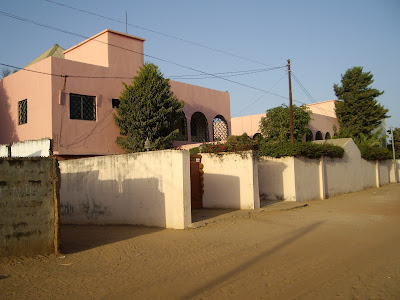CVM House where we live and teach the GTI courses
As soon as we realized that the courses we planned to teach at the University of the Gambia would not be given this semester, because the program was not to ready to start, we began to focus on courses which we knew would be held, those we planned to teach on behalf of the Gambia Theological Institute: Adrian on Ecumenism, and Wendy on the Apostolic Fathers.
Adrian is looking at the modern ecumenical movement by studying some its major statements, beginning with the World Missionary Conference in Edinburgh (1910). His hope is that through better understanding of other churches, students might be inspired to examine their own views of other parts of the body of Christ. And learning how the ecumenical movement has inspired Christians in getting along and cooperating might also help them work for deeper unity among Christians in the Gambia.
Wendy teaching her course
Wendy's course looks at a number of representative documents from early Christian leaders, Bishop Clement of Rome, The Teaching of the Twelve Apostles, or The Shepherd of Hermas to discover how they dealt with challenges of poverty and riches, false teachers, or persecution, as important teachings still valuable for twenty-first century Christians.
Knowing the importance of adequate publicity, we began to work on a flyer to advertise the courses, and also contacted the students we had taught in 2010. The last GTI course, taught by Stephen Ney on the Psalms, was held last October/November, so the students had had a considerable break. Tina, the registrar hired by the Christian Volunteer Movement that sponsors these courses, arranged placing the ad in the local newspapers, and we ourselves sent out notes by phone, email and text messaging.
Arranging the two classes
Even so the courses got off to a bit of a rocky start. Wendy's class on that first Friday (Feb. 10), had seven students, and we certainly expected more for Adrian's class that Saturday. Instead, only three students showed up, and we began to wonder whether we had missed our target in the publicity. However, after further phone calls and emailing, by the next weekend we had more adequate numbers to make the course worthwhile.
We realized that the group of students who have been taking these courses from the beginning have taken at least ten courses, and thus have fulfilled the requirement for a diploma. They are now waiting to hear of their final marks, to discover whether they are eligible for a diploma. The challenge for these GTI courses will be to find another batch of students to take their place. Indeed, our students have assured us that there are still many who can benefit from these courses. Even with a somewhat disappointing start, students are enjoying the courses, participating in readings and discussion. They realize that here in the Gambia there are still few opportunities for them, as teachers or pastors, to receive an education for Christian ministry.
Our GTI students underlined the urgency of starting the university program in Christian Studies in September since some of them would like to enroll in that program. They too want to be able to get a theological degree in the Gambia.


























